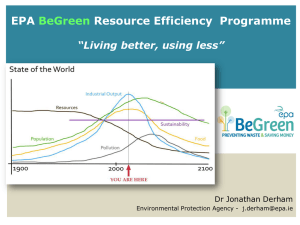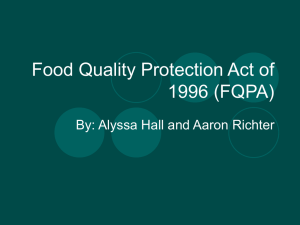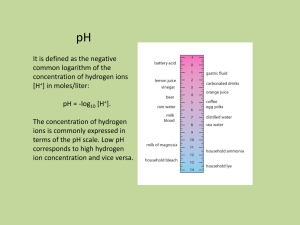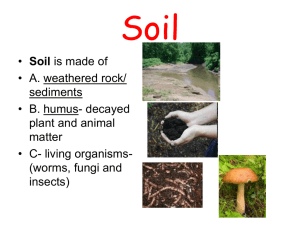html - ncrules.state.nc.us
advertisement
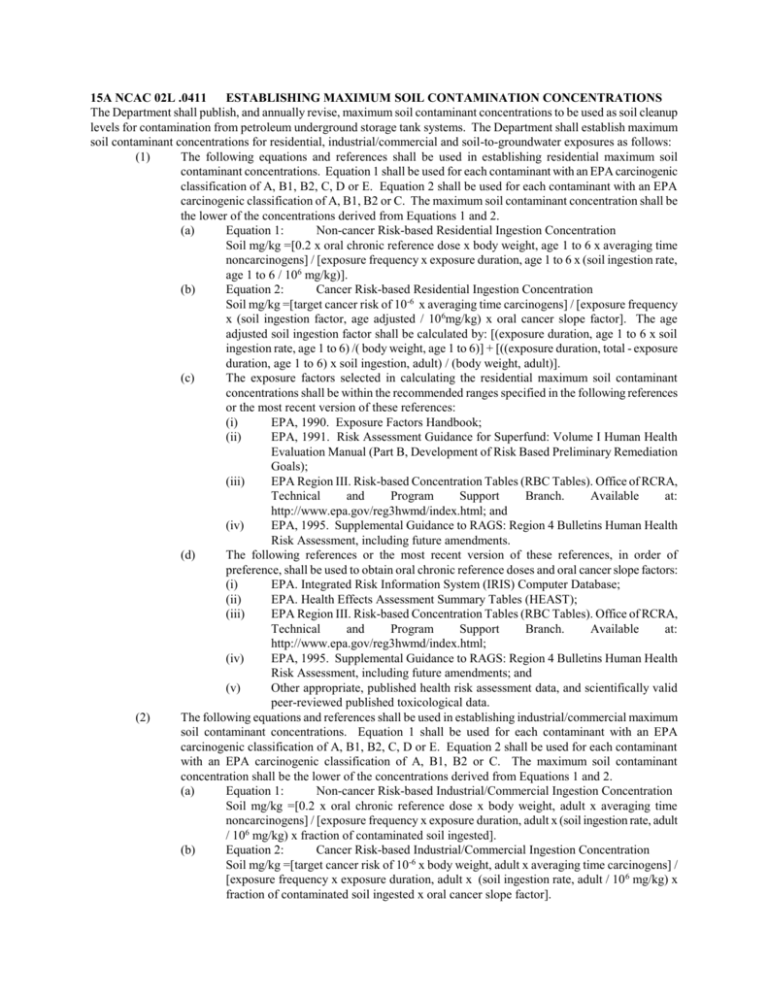
15A NCAC 02L .0411 ESTABLISHING MAXIMUM SOIL CONTAMINATION CONCENTRATIONS The Department shall publish, and annually revise, maximum soil contaminant concentrations to be used as soil cleanup levels for contamination from petroleum underground storage tank systems. The Department shall establish maximum soil contaminant concentrations for residential, industrial/commercial and soil-to-groundwater exposures as follows: (1) The following equations and references shall be used in establishing residential maximum soil contaminant concentrations. Equation 1 shall be used for each contaminant with an EPA carcinogenic classification of A, B1, B2, C, D or E. Equation 2 shall be used for each contaminant with an EPA carcinogenic classification of A, B1, B2 or C. The maximum soil contaminant concentration shall be the lower of the concentrations derived from Equations 1 and 2. (a) Equation 1: Non-cancer Risk-based Residential Ingestion Concentration Soil mg/kg =[0.2 x oral chronic reference dose x body weight, age 1 to 6 x averaging time noncarcinogens] / [exposure frequency x exposure duration, age 1 to 6 x (soil ingestion rate, age 1 to 6 / 106 mg/kg)]. (b) Equation 2: Cancer Risk-based Residential Ingestion Concentration Soil mg/kg =[target cancer risk of 10-6 x averaging time carcinogens] / [exposure frequency x (soil ingestion factor, age adjusted / 106mg/kg) x oral cancer slope factor]. The age adjusted soil ingestion factor shall be calculated by: [(exposure duration, age 1 to 6 x soil ingestion rate, age 1 to 6) /( body weight, age 1 to 6)] + [((exposure duration, total - exposure duration, age 1 to 6) x soil ingestion, adult) / (body weight, adult)]. (c) The exposure factors selected in calculating the residential maximum soil contaminant concentrations shall be within the recommended ranges specified in the following references or the most recent version of these references: (i) EPA, 1990. Exposure Factors Handbook; (ii) EPA, 1991. Risk Assessment Guidance for Superfund: Volume I Human Health Evaluation Manual (Part B, Development of Risk Based Preliminary Remediation Goals); (iii) EPA Region III. Risk-based Concentration Tables (RBC Tables). Office of RCRA, Technical and Program Support Branch. Available at: http://www.epa.gov/reg3hwmd/index.html; and (iv) EPA, 1995. Supplemental Guidance to RAGS: Region 4 Bulletins Human Health Risk Assessment, including future amendments. (d) The following references or the most recent version of these references, in order of preference, shall be used to obtain oral chronic reference doses and oral cancer slope factors: (i) EPA. Integrated Risk Information System (IRIS) Computer Database; (ii) EPA. Health Effects Assessment Summary Tables (HEAST); (iii) EPA Region III. Risk-based Concentration Tables (RBC Tables). Office of RCRA, Technical and Program Support Branch. Available at: http://www.epa.gov/reg3hwmd/index.html; (iv) EPA, 1995. Supplemental Guidance to RAGS: Region 4 Bulletins Human Health Risk Assessment, including future amendments; and (v) Other appropriate, published health risk assessment data, and scientifically valid peer-reviewed published toxicological data. (2) The following equations and references shall be used in establishing industrial/commercial maximum soil contaminant concentrations. Equation 1 shall be used for each contaminant with an EPA carcinogenic classification of A, B1, B2, C, D or E. Equation 2 shall be used for each contaminant with an EPA carcinogenic classification of A, B1, B2 or C. The maximum soil contaminant concentration shall be the lower of the concentrations derived from Equations 1 and 2. (a) Equation 1: Non-cancer Risk-based Industrial/Commercial Ingestion Concentration Soil mg/kg =[0.2 x oral chronic reference dose x body weight, adult x averaging time noncarcinogens] / [exposure frequency x exposure duration, adult x (soil ingestion rate, adult / 106 mg/kg) x fraction of contaminated soil ingested]. (b) Equation 2: Cancer Risk-based Industrial/Commercial Ingestion Concentration Soil mg/kg =[target cancer risk of 10-6 x body weight, adult x averaging time carcinogens] / [exposure frequency x exposure duration, adult x (soil ingestion rate, adult / 10 6 mg/kg) x fraction of contaminated soil ingested x oral cancer slope factor]. (c) (3) The exposure factors selected in calculating the industrial/commercial maximum soil contaminant concentrations shall be within the recommended ranges specified in the following references or the most recent version of these references: (i) EPA, 1990. Exposure Factors Handbook; (ii) EPA, 1991. Risk Assessment Guidance for Superfund: Volume I Human Health Evaluation Manual (Part B, Development of Risk Based Preliminary Remediation Goals); (iii) EPA Region III. Risk-based Concentration Tables (RBC Tables). Office of RCRA, Technical and Program Support Branch. Available at: http://www.epa.gov/reg3hwmd/index.html; and (iv) EPA, 1995. Supplemental Guidance to RAGS: Region 4 Bulletins Human Health Risk Assessment, including future amendments. (d) The following references or the most recent version of these references, in order of preference, shall be used to obtain oral chronic reference doses and oral cancer slope factors: (i) EPA. Integrated Risk Information System (IRIS) Computer Database; (ii) EPA. Health Effects Assessment Summary Tables (HEAST); (iii) EPA Region III. Risk-based Concentration Tables (RBC Tables). Office of RCRA, Technical and Program Support Branch. Available at http://www.epa.gov/reg3hwmd/index.html; (iv) EPA, 1995. Supplemental Guidance to RAGS: Region 4 Bulletins Human Health Risk Assessment, including future amendments; and (v) Other appropriate, published health risk assessment data, and scientifically valid peer-reviewed published toxicological data. The following equations and references shall be used in establishing the soil-to-groundwater maximum contaminant concentrations: (a) Organic Constituents: Soil mg/kg = groundwater standard or interim standard x [(.02 x soil organic carbon-water partition coefficient) + 4 + (1.733 x 41 x Henry's Law Constant (atm.-m3/mole))]. (i) If no groundwater standard or interim standard has been established under Rule .0202 of this Subchapter, the practical quantitation limit shall be used in lieu of a standard to calculate the soil-to-groundwater maximum contaminant concentrations. (ii) The following references or the most recent version of these references, in order of preference, shall be used to obtain soil organic carbon-water partition coefficients and Henry's Law Constants: (A) EPA, 1996. Soil Screening Guidance: Technical Background Document. (EPA/540/R95/128); (B) EPA, 1986. Superfund Public Health Evaluation Manual. Office of Emergency and Remedial Response (EPA/540/1-86/060); (C) Agency for Toxic Substances and Disease Registry, "Toxicological Profile for [individual chemical]." U.S. Public Health Service; (D) Montgomery, J.H., 1996. Groundwater Chemicals Desk Reference. CRC Press, Inc; (E) Sims, R.C., J.L. Sims and S.G. Hansen, 1991. Soil Transport and Fate Database, Version 2.0. EPA Robert S. Kerr Environmental Laboratory; and (F) Other appropriate, published, peer-reviewed and scientifically valid data. (b) Inorganic Constituents: Soil mg/kg = groundwater standard or interim standard x [(20 x soil-water partition coefficient for pH of 5.5) + 4 + (1.733 x 41 x Henry's Law Constant (atm.-m3/mole))]. (i) If no groundwater standard or interim standard has been established under Rule .0202 of this Subchapter, the practical quantitation limit shall be used in lieu of a standard to calculate the soil-to-groundwater maximum contaminant concentrations. (ii) The following references or the most recent version of these references, in order of preference, shall be used to obtain soil-water partition coefficients and Henry's Law Constants: (A) (B) (C) (D) (E) History Note: EPA, 1996. Soil Screening Guidance: Technical Background Document. (EPA/540/R95/128); Baes, C.F., III, R.D. Sharp, A.L. Sjoreen, and R.W. Shor, 1984. A Review and Analysis of Parameters for Assessing Transport of Environmentally Released Radionuclides Through Agriculture. Oak Ridge National Laboratory; Agency for Toxic Substances and Disease Registry, "Toxicological Profile for [individual chemical]." U.S. Public Health Service; Sims, R.C., J.L. Sims and S.G. Hansen, 1991. Soil Transport and Fate Database, Version 2.0. EPA Robert S. Kerr Environmental Laboratory; and Other appropriate, published, peer-reviewed and scientifically valid data. Authority G.S. 143-215.2; 143-215.3(a)(1); 143-215.94A; 143-215.94E; 143-215.94T; 143-215.94V; 143B-282; 1995 (Reg. Sess. 1996) c. 648,s. 1; Recodified from 15A NCAC 02L .0115(m); Amended Eff. December 1, 2005.

